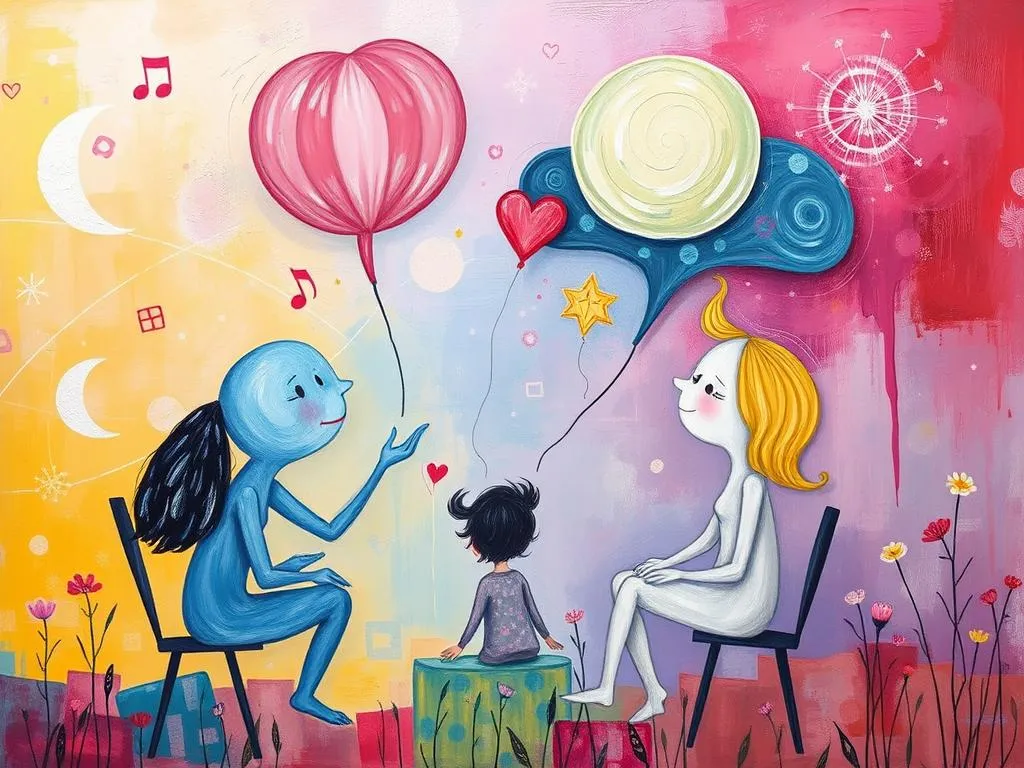
Have you ever woken up from a dream where you were engaged in a profound conversation with someone? Perhaps it was a loved one, a stranger, or even a version of yourself. These dream dialogues can feel strikingly real, leaving you with lingering emotions and questions. As we delve into the realm of dream conversations, we will explore their symbolism, the experiences they reflect, and the potential for personal growth they offer. Let’s embark on this journey together, analyzing the whispers of our subconscious and discovering the wisdom embedded in our dreams.
Dream conversations can range from enlightening exchanges to perplexing dialogues that leave us feeling confused or unsettled. They can act as a mirror, reflecting our thoughts, fears, and desires while unlocking deeper layers of our psyche. By understanding the nature and symbolism of these conversations, we can gain significant insights into our waking lives.
Whispered Secrets: The Language of Symbols
In the world of dreams, symbols act as a universal language, conveying messages that may not be immediately clear. When analyzing dream conversations, it’s essential to consider the characters involved and the setting of the dialogue. Each element carries a unique weight and can reveal much about your inner world.
-
The Speaker: Who is engaging you in conversation? A deceased loved one might symbolize unresolved grief or a desire for closure. A friend could represent companionship or an aspect of yourself that you need to acknowledge. Remember, every character is a potential reflection of your own thoughts and feelings.
-
The Setting: Where does the conversation take place? A familiar café might signify comfort and safety, while a dark alley could indicate feelings of anxiety or fear. The environment often mirrors your emotional state, offering clues about your current life circumstances.
-
The Content: What is being discussed? The topics can range from mundane daily matters to deep existential questions. If the conversation revolves around conflict, it may highlight unresolved issues in your waking life that demand attention. Conversely, a heartwarming exchange might point to your desire for connection and understanding.
-
The Tone: Pay attention to the emotional undertone of the conversation. Are you feeling joy, sadness, anger, or relief? The emotional quality can reveal your subconscious feelings about the subject matter. For instance, a friendly debate might suggest a need to confront differing views, while a comforting dialogue could indicate a longing for support.
-
Recurring Characters: If you frequently encounter the same character in your dreams, they may symbolize a persistent aspect of your psyche or an unresolved relationship. Consider what this character represents to you, as their presence can indicate something significant that requires your attention.
By unraveling these layers, you can begin to decode the messages embedded in your dream conversations. Each symbol invites you to reflect on your waking life, offering a deeper understanding of your emotional landscape.
Chasing Shadows: Conversations in Dreamland
Dream conversations can take on various forms, often influenced by our personal experiences, fears, and aspirations. Let’s explore several scenarios that might resonate with you, illustrating how these encounters can reveal insights into our lives.
-
The Argument with a Loved One: Imagine you’re engaged in a heated debate with your partner about a pressing issue. In the dream, emotions run high, and you find yourself expressing feelings you’ve held back in reality. This scenario may reflect underlying tension in your relationship, signaling a need for open communication. Consider addressing these issues in your waking life, as ignoring them may lead to further conflict.
-
A Conversation with a Mentor: Envision having a heartfelt discussion with a mentor or role model. They offer you invaluable advice that resonates deeply. This dream might symbolize your desire for guidance and support in your current endeavors. Reflect on the areas of your life where you feel uncertain, and seek out sources of wisdom, whether through relationships or personal development.
-
Talking to a Stranger: Picture a dream where you engage in a casual conversation with a stranger who shares profound insights. This stranger could symbolize an unexplored part of yourself or a new perspective you haven’t considered. Embrace this openness to new ideas and experiences, allowing yourself to grow and evolve.
-
Reconnecting with a Deceased Loved One: In this poignant dream, you have a conversation with someone who has passed away. They share words of comfort or wisdom that resonate with you. This dream might represent your unresolved feelings of grief or a longing for closure. It can also serve as a reminder to honor their memory and integrate their lessons into your life.
-
Debating with Your Future Self: Imagine a dialogue with a future version of yourself, discussing the choices you’ve made and the path ahead. This dream could reflect your anxieties about the future and the decisions you face. It encourages you to consider the consequences of your actions and to align your current choices with your long-term goals.
Each of these scenarios illustrates how dream conversations can serve as a powerful tool for self-reflection. By analyzing the context and emotions surrounding these dialogues, you can uncover the deeper meanings behind your dreams and apply these insights to your waking life.
The Path to Transformation: Growing Through Dialogue
Dream conversations hold remarkable potential for personal growth and transformation. By engaging with these dialogues, you open the door to self-discovery and healing. Here are some practical insights to help you harness the power of your dream conversations:
-
Journaling Your Dreams: Start a dream journal to capture your conversations and the emotions tied to them. Writing down your dreams immediately upon waking can help you remember the details and symbols. Over time, you may notice patterns or recurring themes that can provide clarity about your life’s journey.
-
Reflecting on Your Emotions: After recalling a dream conversation, take a moment to reflect on the emotions you experienced. Ask yourself how these feelings relate to your daily life. Are there unresolved conflicts, desires for connection, or fears that need addressing? Acknowledging these feelings is the first step toward healing.
-
Engaging in Dialogue: Consider holding a conscious dialogue with the characters from your dreams. You can visualize the conversation and express your thoughts and feelings. This practice can help you address unresolved issues and gain closure on past experiences.
-
Integrating Insights: As you gain insights from your dream conversations, think about how you can integrate these lessons into your waking life. Whether it’s improving your communication with loved ones or pursuing new opportunities, using your dreams as a guide can foster personal growth.
-
Seeking Professional Help: If you find that your dream conversations bring up significant emotional distress or unresolved issues, consider seeking support from a therapist or counselor. They can help you navigate your feelings and provide tools for personal development.
Ultimately, dream conversations serve as a bridge between our conscious and unconscious minds, inviting us to explore our inner landscapes. By embracing the messages they convey, we can foster personal growth and transformation, leading us toward a more fulfilling life.
As we conclude our exploration of dream conversations, remember that these dialogues are not just fleeting moments of imagination; they are windows into your soul. They offer profound insights into your thoughts, desires, and fears, encouraging you to engage with your inner self. The next time you find yourself in a dream conversation, pause and listen closely. There may be a message waiting for you—a whisper of wisdom guiding you on your path toward self-discovery and growth.
In the end, embrace the conversations of your dreams, for they hold the keys to understanding not just your mind, but the very essence of who you are.







